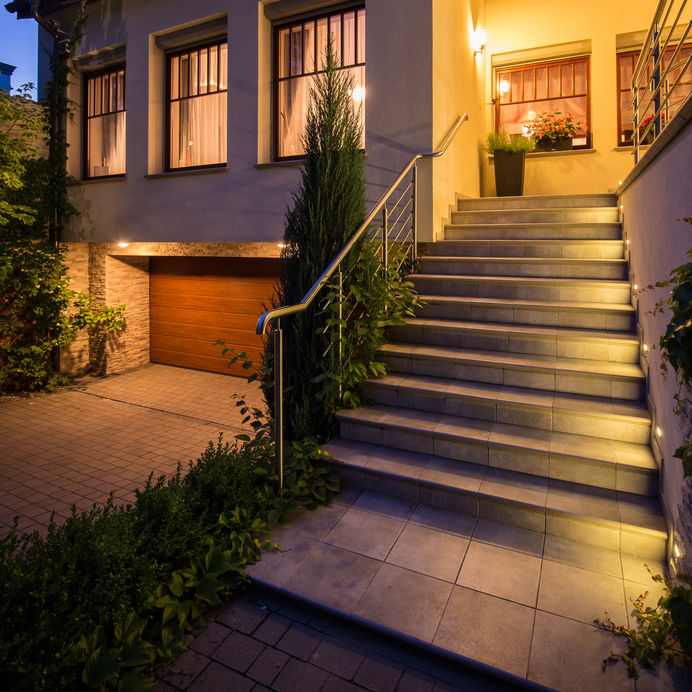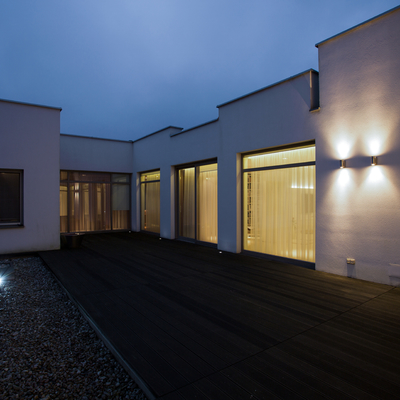
Illuminate the outdoors
Outdoor lighting can make a huge difference in your house at night. Not only from the appearance but the security it offers too. You can choose outdoor lights for houses that go along the walkway or placed in the flowerbed to accent the shrubbery and another décor. There are outdoor lights to hang in trees in the backyard as you entertain guests, or simply enjoying your yard with the family while cooking out or swimming.
Many homeowners forgo having outdoor lights because of the added expense to the electric bill when they forget to turn them off. Today though, there are outdoor lights with a timer that you can set to turn on and off at certain times, even different times each day. There are lights that sync with your mobile device today so that you can operate them when you’re late getting home.
Are LED lights good for outdoor use?
Yes, in fact, today, lighting experts are recommending LED lighting over other outdoor lights because they are better. There are two main quality indicators that you want to consider if you’re not sure about which outdoor lights to go with when it comes to LED lighting.
- Color Temperature
- Color Rendering Index
The Color Temperature defines the glow of the light. It can range from a cool white/bluish to a warm reddish-orange. This is a preference outdoor lighting thing and with LED technology, there is a wide range to choose from today.
The Color Rendering Index advises you on how close the objects that are illuminated appear comparatively under daylight conditions. This is having a value of 90 or above is more aim, making it an excellent choice in outdoor lights.
What is the best material for outdoor lighting fixtures?
When choosing outdoor lights for your home, have some knowledge and understanding about the different materials and metals used, because basing your choices simply on how a light fixture looks, isn’t enough. The choices of metal that outdoor lights are available in a range from aluminum to brass, from copper to stainless steel. Read on to learn the pros and cons of the different metals to choose from for your outdoor lights.
Aluminum
Aluminum outdoor light fixtures are popular because they are inexpensive. They are also a low-quality metal that isn’t meant for extended outdoor use due to oxidization. Aluminum that is painted will fade quickly unless it is powder-coated. In a coastal area where the air may carry salt from the water, the aluminum lighting will corrode.
Brass
Because brass is a hard metal, it will hold up longer in any environment. The combination of copper and zinc that makes brass, it won’t corrode and has an extensive lifespan, making it perfect for a coastal setting. However, it will not keep that brass appearance because it will “patina” when exposed to the outdoor elements. Brass fixtures for outdoor lights are a durable and high-quality metal with a long-life expectancy.
Copper
Copper is another material that is great outdoor lights, even though it isn’t as durable as brass, it will also “patina” with age. A con to this metal is the rarity of it makes it a high theft metal.
Stainless Steel
For a modern-styled home, stainless steel is the perfect metal for outdoor lights. It reflects the sun, but also requires more maintenance than the other metals we’ve discussed. Stainless steel will corrode if not kept cleaned and/or has a chromium oxide layer for protection.
Vivex
This revolutionary outdoor lighting material is notches above the typical polyurethane resin material found on most outdoor lights. It comprises a unique synthetic of ground marble powder and a latex composite that gives it durability and strength when those two agents are bonded together. Testing of this biodegradable material has found that it can withstand temperatures below -20°F and up to or above 130°F, making it a great metal for all regions.
What are the best lights for outside?
Your backyard, front yard, or garden area can be transformed into a personal and unique style with the right outdoor lights. Not only will the right outdoor lights make your house stand out, but they allow you to enjoy your outdoor living space longer.
One of the first things you should know as you shop for outdoor lights is that this is one area where more is better, meaning, the more you pay, the better the quality, especially if you’re going with solar lighting. If you are going to be attaching the outdoor lights to your home, experts recommend going with wired instead of solar, and with that in mind, having a professional electrician, landscaper, and in often, a roofing contractor, to install them is always best. A few ideas for your outdoor lights:
- If you have a small area, such as a garden, the better the light is a wall-mounted light. If it is a path or walkway with gardens on either side, string lights are best and can be left year-round. If you like the look of solar, go with the free-standing lantern on a table or hanging from a tree branch.
- The classic spike lights are always a popular choice for a garden or to illuminate pathways and ponds. If you will choose solar, you want to make sure they will get plenty of sunlight, so they work well at night. Directional lights are a classic option if you’re looking to highlight a statue or water feature you want to make a statement.
Before you make any final choice in outdoor lights, make certain they are rated for outdoor use and are weather-resistant. Keep in mind that lighting for a pond will differ from garden lighting.
What is a good wattage for outdoor lights?
It depends on the area that you want to illuminate. The average outdoor light wattage is 80 watts; however, a lower wattage is better for some areas and uses. Like a garden or pathway, 40 watts is plenty. However, the driveway or a small backyard, you may brighter lights and 80 watts would be best.

How many lumens do you need to light a backyard?
Outdoor lighting lumens range between 12 and 1300, with recommended path lighting and step lighting at 100 lumens. For floodlighting and motion sensor lighting, we recommend 700 lumens. When looking for underwater lighting like a fountain, a pond or pool, 200 to 400 lumens is recommended, and wall lights should have 50 to 185 lumens. Fifty to 300 lumens are enough for general landscape lighting.
Outdoor lights can change the whole curb appeal to your home in the evenings, make it a warm welcome for guests while providing security. For the backyard, outdoor lighting allows you to enjoy that extension of your home for entertaining or simply just enjoying your backyard year-round. Call 817-396-0125 today for outdoor lighting in Dallas-Fort Worth, TX from MDM Landscapes.
